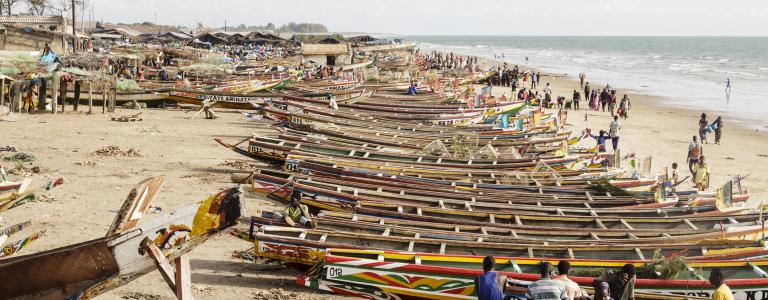Accelerating Africa’s Action for Sustainable Fisheries Management
This webinar aimed to support African countries in understanding the WTO Fisheries Subsidies Agreement, including its key provisions, the steps required for ratification, and the various support mechanisms available for effective implementation. Attendees will gain insights into how the agreement can contribute to sustainable fisheries management across the continent.
Background
Africa’s fisheries sector is essential for over 400 million people, providing critical food sources and livelihoods, especially in coastal and island communities. However, overexploitation of marine resources, often driven by subsidies that encourage unsustainable fishing, has depleted fish stocks and undermined local economies. In response, the WTO Agreement on Fisheries Subsidies, adopted in 2022, aims to curb harmful subsidies, reduce illegal fishing, and promote sustainable fisheries management globally. This agreement holds special significance for African nations, enabling them to protect resources and increase local economic benefits without restricting domestic fisheries development.
The African Union (AU) has long prioritized sustainable fisheries and aquaculture, advancing governance through frameworks like the 2014 Malabo Declaration and the 2019 Africa Blue Economy Strategy. To support African countries in ratifying and implementing the WTO Agreement, this webinar—organized by the African Union Development Agency (AUDA-NEPAD) in collaboration with IISD—provided insights into the agreement’s provisions, shared ratification experiences, and explored support mechanisms like the WTO Fisheries Funding Mechanism and IISD’s Self-Assessment Tool. This session aimed to build momentum for ratification and support sustainable, long-term fisheries management across Africa.
About the event
This webinar was designed for government officials, especially from AU Member States, who are involved in fisheries, foreign affairs, finance, and trade sectors. The event was also open to representatives from regional bodies, AU organizations, and development partners supporting Africa’s sustainable fisheries initiatives.
Participants gained insights into the agreement's key provisions, heard about the experiences of African countries that have completed ratification, and explored mechanisms for post-ratification support. The webinar emphasized the importance of this agreement in combating harmful fishing subsidies and enhancing sustainable fisheries management, which is critical for Africa’s food security, economic stability, and marine resource conservation.
Agenda (times in EAT)
3:00–3:10 pm. Welcoming remarks
- Bernice McLean, Senior Program Officer, Blue Economy, African Union Development Agency (AUDA-NEPAD)
3:10–3:30 pm. The WTO Agreement on Fisheries Subsidies: An explainer
- Sainabou Taal, Head, Fisheries Subsidies, World Trade Organization (WTO)
3:30–3:50 pm. Support for Implementation: The WTO Fisheries Funding Mechanism
- Jonathan Werner, Manager, WTO Fisheries Funding Mechanism (WTO Fish Fund)
3:50–4:10 pm. The Self-Assessment Tool for the Implementation of the WTO Fisheries Subsidies Agreement
- Tristan Irschlinger, Senior Policy Advisor, Fisheries Subsidies, International Institute for Sustainable Development (IISD)
4:10–4:40 pm. Experiences and lessons learned by African Member States who have successfully deposited their instrument of acceptance
- Representatives from African Union Member States
4:40–4:55 pm. Q&A
- All panelists
4:55–5:00 pm. Closing remarks
- Bernice McLean, Senior Program Officer, Blue Economy, African Union Development Agency (AUDA-NEPAD)
